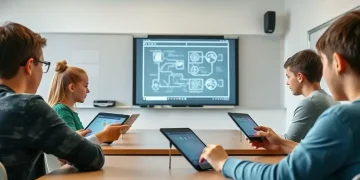AI tutors reshape remote education dynamics

Anúncios
AI tutors reshape remote education by providing personalized learning experiences, enhancing accessibility, and offering immediate feedback, which significantly improves student engagement and performance.
AI tutors reshape remote education, presenting personalized learning approaches that adapt to student needs. Imagine having a learning companion that tailors lessons just for you.
Anúncios
Understanding AI tutors in remote learning
Understanding AI tutors in remote learning is essential for embracing modern education. These innovative tools adapt to individual learning styles, making education more personalized.
What are AI Tutors?
AI tutors are digital platforms powered by artificial intelligence. They offer customized instruction based on a student’s unique needs and progress. With advanced algorithms, these tutors analyze learning patterns and areas that require improvement.
Anúncios
How Do AI Tutors Work?
AI tutors use data to tailor the learning experience. They can create practice questions, give feedback, and adjust difficulty levels. This interactivity makes learning more engaging and effective. Here are a few key features:
- Personalized lesson plans that cater to individual strengths.
- Real-time feedback on assignments and quizzes.
- 24/7 availability for students to learn at their own pace.
- Interactive activities to enhance engagement and retention.
Moreover, AI tutors can help identify knowledge gaps. They track progress and suggest topics that need more focus. This proactive approach helps students stay on track with their learning objectives.
As remote education becomes more prevalent, understanding how to integrate AI tutors into study routines is crucial. These tools provide flexibility, allowing students to learn whenever and wherever it suits them best. They also facilitate collaboration, with features enabling students to connect with peers and educators effectively.
Benefits of using AI tutors for students

Using AI tutors for students offers numerous advantages, transforming the educational landscape. These tools enhance learning experiences by providing personalized guidance tailored to each learner’s needs.
Personalized Learning Experience
One of the primary benefits of AI tutors is the ability to customize lessons. Unlike traditional classrooms, AI can adjust the pace and difficulty to match individual students. This ensures that learners are not left behind and can progress at their own speed.
Accessible Learning Anytime
AI tutors create more accessible education. Students can learn whenever they feel ready, whether it’s early morning or late at night. This flexibility allows them to fit education into their busy schedules.
- They can review topics on demand.
- Practice exercises are available 24/7.
- Students can revisit previous lessons at any time.
Additionally, the interactive nature of AI tutors keeps students engaged. Many AI platforms use gamification techniques, making learning fun and motivating. Students can earn rewards, earn points, and track their progress, which enhances their overall learning experience.
Another important aspect is the instant feedback provided by AI tutors. When students submit assignments or take quizzes, they can receive immediate responses. This helps them understand their mistakes quickly and learn effectively without waiting for teacher feedback.
Furthermore, these tutors can help identify areas where students struggle, allowing for targeted improvements. By analyzing performance data, AI tutors can suggest specific resources or topics for further study, ensuring a more directed learning path for each student.
Challenges in implementing AI tutors
The implementation of AI tutors brings several challenges that educational institutions must consider. Understanding these challenges is crucial to harnessing the full potential of AI in education.
Technical Limitations
One major challenge is the technical capabilities of AI systems. Many educational institutions may not have the required infrastructure to support advanced AI technologies. AI tutors require high-speed internet, reliable software platforms, and sufficient hardware. This can be a barrier, especially in underserved areas.
Training and Support
Another significant hurdle involves training educators and students to use these tools effectively. Without proper training, both teachers and students may struggle to utilize AI tutors effectively. Educational programs must include training sessions to help users become proficient with the technology.
- Ongoing support is essential for troubleshooting.
- Workshops can help teachers integrate AI into their teaching.
- Students may need guidance on how to maximize AI resources.
Additionally, concerns about the accuracy of AI tutors can pose challenges. Students may not always receive the correct information or appropriate feedback, leading to potential misunderstandings. Continuous monitoring and updates are needed to ensure that AI tutors provide reliable content.
Privacy and data security are also crucial issues. When students interact with AI platforms, they generate data that must be safeguarded. Educational institutions have a responsibility to protect this information, ensuring compliance with regulations.
Moreover, there is the challenge of ensuring that AI tutors remain accessible to all students. Equity in access is essential; if some students cannot access this technology, the gap in educational opportunities may widen.
Future of AI tutors in education

The future of AI tutors in education is bright and full of potential. As technology advances, we can expect these tools to become even more integrated into everyday learning.
Enhanced Personalization
One significant trend will be the enhancement of personalized learning experiences. Future AI tutors will use advanced algorithms to analyze vast amounts of student data. This will allow them to create even more tailored lesson plans, addressing individual strengths and weaknesses.
Greater Accessibility
Another promising development is improved accessibility. With advancements in mobile technology and internet connectivity, AI tutors will reach more students, including those in remote or underserved areas. This access can help bridge educational gaps that exist today.
- AI tutors will be available in various languages, catering to diverse student populations.
- They can adapt to different learning paces and styles, making education more inclusive.
- Students will have access to resources anytime, anywhere, promoting continuous learning.
Moreover, as AI continues to evolve, we can expect more interactive and engaging content. Future AI tutors might incorporate virtual reality (VR) or augmented reality (AR) elements. This can transform traditional lessons into immersive experiences, enhancing understanding and retention.
Collaboration between AI tutors and educators will be crucial. Teachers will have the ability to monitor student progress through detailed analytics provided by AI systems. This collaboration will enable educators to focus on teaching while AI handles administrative tasks and personalized student support.
Finally, ethical considerations will play a substantial role in the future of AI tutors. As data privacy and security become more important, educational institutions will need to ensure that student data is protected. Transparency in AI operations will also increase trust among users.
FAQ – Frequently Asked Questions about AI Tutors in Education
What are AI tutors?
AI tutors are digital tools that use artificial intelligence to provide personalized learning experiences for students.
How can AI tutors help students?
AI tutors enhance learning by offering tailored lessons, instant feedback, and 24/7 accessibility to resources.
What challenges are associated with implementing AI tutors?
Challenges include technical limitations, the need for proper training, and concerns about data privacy.
What is the future potential of AI tutors?
The future includes greater accessibility, enhanced personalization, and the integration of immersive technologies like VR.





